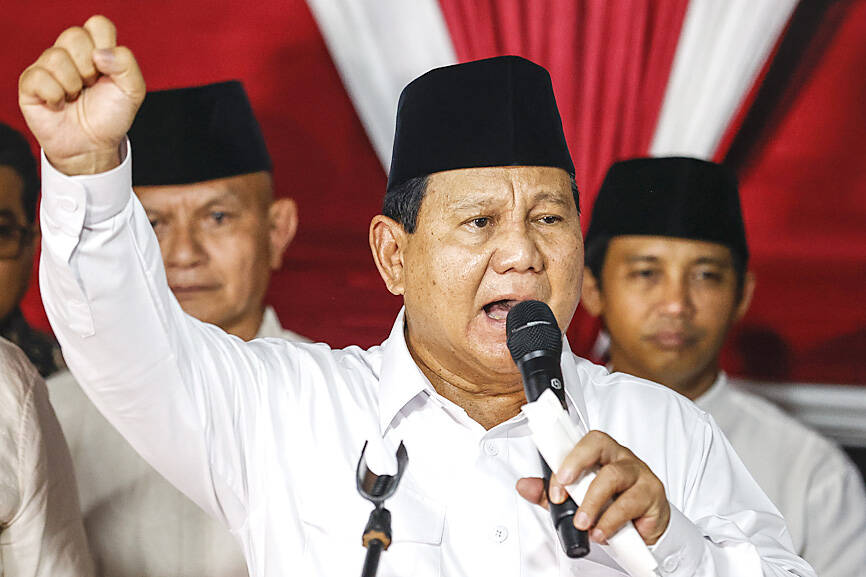Prabowo Subianto, a former special forces general with ties to Indonesia’s current president and past dictatorship, was confirmed the victor of last month’s presidential election over two former governors who have vowed to contest the result in court.
Subianto won 58.6 percent of the votes, while former Jakarta governor Anies Baswedan received 24.9 percent and former Central Java governor Ganjar Pranowo got 16.5 percent, the Indonesian General Election Commission said on Wednesday after the official counting was completed.
In Taipei, the Ministry of Foreign Affairs, on behalf of President Tsai Ing-wen (蔡英文) and Vice President William Lai (賴清德), yesterday congratulated the president-elect and vice president-elect, and commended the Indonesian people and government for completing a democratic and peaceful election.

Photo: EPA-EFE
Taiwan and Indonesia share the values of freedom and democracy and jointly face challenges related to climate change, food security and supply chain resilience, the statement said.
Taiwan hopes to continue deepening cooperation with Indonesia in economy and trade, culture, medical and health, science and technology, education, agriculture and labor based on existing friendly ties to jointly safeguard the freedom, openness, peace and prosperity in the region, it added.
Meanwhile, the two other Indonesian presidential candidates have alleged fraud and irregularities in the election process, such as the vice presidential candidacy of Indonesian President Joko Widodo’s son.
The popular outgoing president is serving his second term and could not run again, but his son’s candidacy is seen as a sign of his tacit backing for Subianto.
Widodo’s son, Gibran Rakabuming Raka, is 37, but became Subianto’s running mate after the Constitutional Court made an exception to the minimum age requirement of 40 for candidates.
The Constitutional Court’s chief justice, who is Widodo’s brother-in-law, was then removed by an ethics panel for failing to recuse himself and for making last-minute changes to the election candidacy requirements.
Subianto, who is Widodo’s defense minister, had claimed victory on election day after unofficial tallies showed he was winning nearly 60 percent of the votes.
Voter turnout for the Feb. 14 election in the world’s third-largest democracy was about 80 percent, the commission said.
Subianto won in 36 of 38 provinces and received 96.2 million votes compared with 40.9 million for Anies Baswedan, the second-place finisher, who won in two provinces.
Pranowo, the candidate of the governing Indonesian Democratic Party of Struggle, received 27 million votes and did not win any provinces.
Additional reporting by Liu Tzu-hsuan

The US government has signed defense cooperation agreements with Japan and the Philippines to boost the deterrence capabilities of countries in the first island chain, a report by the National Security Bureau (NSB) showed. The main countries on the first island chain include the two nations and Taiwan. The bureau is to present the report at a meeting of the legislature’s Foreign Affairs and National Defense Committee tomorrow. The US military has deployed Typhon missile systems to Japan’s Yamaguchi Prefecture and Zambales province in the Philippines during their joint military exercises. It has also installed NMESIS anti-ship systems in Japan’s Okinawa

TRAGEDY STRIKES TAIPEI: The suspect died after falling off a building after he threw smoke grenades into Taipei Main Station and went on a killing spree in Zhongshan A 27-year-old suspect allegedly threw smoke grenades in Taipei Main Station and then proceeded to Zhongshan MRT Station in a random killing spree that resulted in the death of the suspect and two other civilians, and seven injured, including one in critical condition, as of press time last night. The suspect, identified as a man surnamed Chang Wen (張文), allegedly began the attack at Taipei Main Station, the Taipei Fire Department said, adding that it received a report at 5:24pm that smoke grenades had been thrown in the station. One man in his 50s was rushed to hospital after a cardiac arrest

‘WIN-WIN’: The Philippines, and central and eastern European countries are important potential drone cooperation partners, Minister of Foreign Affairs Lin Chia-lung said Minister of Foreign Affairs Lin Chia-lung (林佳龍) in an interview published yesterday confirmed that there are joint ventures between Taiwan and Poland in the drone industry. Lin made the remark in an exclusive interview with the Chinese-language Liberty Times (the Taipei Times’ sister paper). The government-backed Taiwan Excellence Drone International Business Opportunities Alliance and the Polish Chamber of Unmanned Systems on Wednesday last week signed a memorandum of understanding in Poland to develop a “non-China” supply chain for drones and work together on key technologies. Asked if Taiwan prioritized Poland among central and eastern European countries in drone collaboration, Lin

ON ALERT: Taiwan’s partners would issue warnings if China attempted to use Interpol to target Taiwanese, and the global body has mechanisms to prevent it, an official said China has stationed two to four people specializing in Taiwan affairs at its embassies in several democratic countries to monitor and harass Taiwanese, actions that the host nations would not tolerate, National Security Bureau (NSB) Director-General Tsai Ming-yen (蔡明彥) said yesterday. Tsai made the comments at a meeting of the legislature’s Foreign Affairs and National Defense Committee, which asked him and Minister of National Defense Wellington Koo (顧立雄) to report on potential conflicts in the Taiwan Strait and military preparedness. Democratic Progressive Party (DPP) Legislator Michelle Lin (林楚茵) expressed concern that Beijing has posted personnel from China’s Taiwan Affairs Office to its